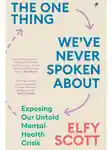AT MECCA, ADVANCING EQUALITY THROUGH THE EDUCATION AND EMPOWERMENT OF WOMEN AND GIRLS IS A KEY FOCUS OF OUR SOCIAL CHANGE INITIATIVE, MECCA M-POWER.
When Elfy Scott was little, she would leave other people’s houses with a weird feeling that something wasn’t quite right in her own home.
“On some level, I knew that Mum getting angry at people who weren’t there was strange, but I never had a word for it,” she reveals.
Elfy didn’t hear the word ‘schizophrenia’ until she was in her early teens, when it was mentioned to her by a counsellor at school – “and even then, I had no basis for understanding what it was.”
Instead, Elfy tried to connect the dots herself to figure out what that word meant, and in her book The One Thing We've Never Spoken About, she shares how it shaped her life.
Many can relate to a lack of communication within families; sometimes we talk about everything else, but avoid the things that really need to be said.
“I don't blame my parents at all for that [lack of explanation] – the dialogue around mental health is difficult at the best of times, particularly for people of their generation,” Scott explains, adding that she believes her parents were trying to protect her.
Of course, kids are perceptive.
“When I think back now, I can only really sort of put words to the isolation that I was feeling,” she recalls.

That sense of isolation was magnified for Scott’s mother, who began having auditory hallucinations shortly after giving birth to her first child and moving from London to Sydney.
“I think that she was feeling really displaced and stressed,” Scott says.
She started to hear a “deep male voice”, which became “more and more aggressive as she ignored it over the years.”
“I can only imagine how alone and afraid you would feel to be experiencing this awful thing that you couldn't tell people about it,” Scott adds.
Scott’s mother only sought psychiatric treatment when she was pregnant with her second child.
She remembers going to one of her mum’s psychiatrist appointments, and being told that mental health conditions were the same as any other: “I remember him saying that schizophrenia is like diabetes – you've got to stay on your medication,” she says.
While her mother’s treatment was “incredibly effective”, with only a handful of episodes – and none requiring hospitalisation – others haven’t been as fortunate.
“One of the things people don't really understand about the condition is that there is a vast spectrum of experience,” explains Scott.


Scott – who was herself diagnosed with depression at 14 – explores our nation's public discourse, emergency services and healthcare systems around mental health in The One Thing We’ve Never Spoken About.
“Stigma is kind of just a way of routinely averting our gaze from the real issues,” she says. “The way I have come to think about mental health is not as something that should sit independently of any other part of society, but something that's a product of everything else we do.”
Perhaps, if we are all part of the problem, the good news is that we can all be part of the solution too.
The One Thing We’ve Never Spoken About is available to purchase here.





